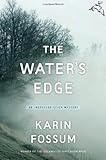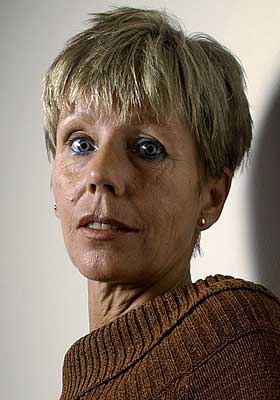
 |
| Karin Fossum |
I think Karin Fossum is the most emotionally interesting of crime writers. She moves you and makes you think about our relationships to one another in our communities. Regional Norway becomes a crucible of the rest of our existence and what assumptions may rule our perceptions. Her stories aren't so much about Inspectors Konrad Sejer and Jakob Skarre but about us. These coppers are mere conduits to confronting underlying conundrums. This story has a lot to say about the relationships mothers have with their young sons and sons have with their carers; about the yearning to have children and the struggle of child rearing.
The criticism levied at this novel -- that it indulges pedophilia is bunkum. In Fossum's universe there is no strict separation between good and evil. The medley of humans existing, of growing up and ageing in cohabitation with one another -- in the communities bequeathed to us -- is far more complex and engaging that the simple rule of law. Law, after all won't explain brutality -- it serves at best only as a means to assuage it.
In that sense Fossum isn't a very noir novelist. Darkness isn't as pervasive as the over bearing complexity that we have to deal with every day especially among the other humans with whom we co-exist.
But then Fossum is always open to lightness (and being! if you want to be truly empathetic) , to hope and the pleasures that we can obtain through knowing others -- including, it needs to be said, faithful dogs! We need to celebrate these pleasures because when we lose them -- such as through murder -- the loss is the more difficult to bear.
Pain is given absolute respect by Fossum. It is never a plot device. Pain and anguish, rather than murder and sin, are the most human of our collective existence. It is what enriches our humanity. It's not the dirty deeds --- dirty and brutal as they may be -- but that we must all learn to live with the weight of their dead hand.
So for Fossum the prospect of loss -- of having loved ones brutally taken from us -- is the most painful of what we may have to bear.
The funeral described in the novel captures that anguish so very well. After a ritualised, highly theatrical ceremony, seemingly beautifully engineered, the facade falls apart:
"Then something happened. No one was prepared for it. The vicar was shocked, everyone could see that. Some people clasped a hand over their mouth in fear, and Sejer felt an icy chill shoot down his back. Elfrid Løwe started to scream. The service had helped her maintain her composure, she had clung to the vicar's voice, but now she was screaming uncontrollably heartbreakingly, a protest which made people jump in their pews. The screams came from deep within her and pushed their way out with a force no one would have believed such a tiny woman possessed. For the best part of an hour the vicar had built a fragile construction of comfort and resignation. Now she tore it down. She screamed and she demolished it and people could no longer mourn with dignity."
Mourning with dignity? Evil doers will be punished (if not by us then by some god)? Law and coppers can make it all better again?...that's what society asks of us, or at least, asks us to believe in.
That's not how Karin Fossum tells it.
